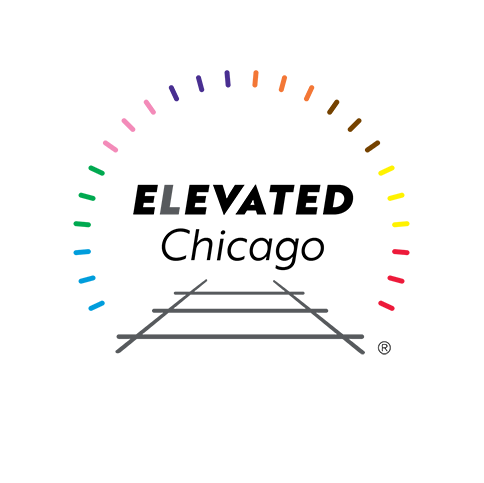Our 2025-2027 Workplan
Elevated Chicago is excited to share our 2025-2027 Work Plan. These priorities were developed by and with Elevated Chicago’s Working Groups, Community Tables, Steering Committee, Leadership Council and staff.
Our work in the areas of People, Place, and Process are guided by two overarching principles: Purpose, which describes how our initiatives serve communities, and Practice, which reflects our internal commitment to accountability, collaboration, and inclusivity.
People
We support neighborhood residents, especially Black, Brown, and Indigenous residents, business owners, aspiring developers, and artists, who live and work within the 1/2-mile radius of transit hubs. By amplifying resident power and fostering community culture, we aim to strengthen local engagement and leadership.
Our Purpose
Uniting ETOD champions
We will continue amplifying residents’ power by fostering engagement in decision-making tables, building a sense of ownership, and uniting stakeholders who see the benefits of equitable transit-oriented development (ETOD).
ETOD education boost
By sharing information and tools about urban planning and development, we will enhance residents’ ability to influence local projects and policy decisions effectively.
Amplifying community culture
Through cultural amplification, we will partner with residents to promote inclusivity, foster community pride, and create economic opportunities for local artists. This work will ensure that cultural vibrancy remains at the heart of ETOD efforts.
Our Practice
Smooth transitions, strong continuity
We will ensure smooth onboarding and offboarding processes while strengthening collaboration, trust, and memory.
Teamwork remix
We will continuously assess the size and structure of membership across our governance body to ensure they are appropriately staffed to meet our goals. By fostering a supportive and connected environment, we will ensure members feel valued and that teams reflect the diversity of the people we serve.
Intentional partnerships for collective power
We will increase collaboration with aligned organizations to advocate for equitable development, policy, and research. By amplifying diverse voices, we will unify efforts toward advancing ETOD.
Place
We transform the built environment around public transit hubs to address inequities in disinvested and gentrifying neighborhoods. By investing in vibrant, healthy, and climate-resilient spaces, we aim to improve the quality of life for all residents.
Our Purpose
Brick-and-mortar investments
We will invest capital and provide technical support to projects that directly address racial equity, public health, climate resilience, and cultural vitality.
Cultural place making and place keeping
Overlooked spaces like empty lots and underpasses will be transformed into cultural hubs and vibrant community spaces that reflect local values.
Walkability and mobility justice
Enhancing pedestrian safety, beautifying infrastructure, and ensuring accessibility will remain priorities, connecting residents to opportunities and each other.
Our Practice
Locally active in Chicago
We will focus on Chicago neighborhoods most affected by displacement and inequities in the built environment, while also supporting equitable development efforts citywide.
A thought partner across our region and state
Beyond Chicago, we will collaborate with partners across the region and state to advance equitable transit-oriented development and address shared challenges.
Nationally, a member of the growing ETOD community of practice
Nationally, we will continue efforts to shift the narrative around ETOD, share lessons learned with peer cities, and participate in national coalitions to contribute to federal systems change.
Healthy and climate-resilient spaces
We will partner with local organizations to create green spaces, improve tree coverage, and implement stormwater management solutions to combat climate change and promote sustainable development.
Process
We push public, private, and civic organizations to create transparent and inclusive processes that ensure accountability and maximize community impact.
Our Purpose
Equitable policy leaders
As co-leaders of Chicago’s ETOD Policy Plan, we will work collaboratively across stakeholders to refine and implement strategies to ensure community-driven development aligns with equity, health and sustainability goals.
Advocate, amplify, and advance
We will advocate for increased funding and policies that support ETOD, collaborating with regional and national partners to advance a federal ETOD agenda.
Principled community engagement
By leveraging tools like the In.Field Kit, we will amplify community power and deepen participation in decision-making processes, creating a more inclusive and delightful approach engaging residents in ETOD projects.
Our Practice
Governance refresh
We will strengthen our coalition’s cohesion through clear decision-making processes, transparent guidelines, and improved communication, fostering collaboration and accountability across all members.
Set, follow, and reflect on our chosen path
We will regularly evaluate and refine our activities to ensure alignment with our purpose and values, staying accountable to residents’ needs.
Coalition cohesion
Our collective work is a shared effort. We will ensure transparency and communication across coalition members, fostering unified implementation of the work plan.
